They say that the best things in life come for free… but when it comes to driving, it's another story. First, there's the cost of buying the car, which is staggering enough by itself. Add in insurance and maintenance, and you can practically feel the money fluttering away from your wallet. Then, as one final blow, you also have to pay the government for the privilege of driving. Yep, we're talking vehicle tax. However, if you're particularly savvy, you can swerve this expense by going for a tax-exempt car.
In this article, we'll explain why you won't have to pay vehicle tax for certain types of car, before providing a quick buyer's guide to some of the best tax-exempt models on the market. A word of caution, though—there's a quirk of the rules you'll need to watch out for. Read on to see why you still need to tax any vehicle, even if you don't have to pay a penny…
This article was originally written in February 2020 but prices were updated in July 2022. All prices shown are the manufacturers RRP — some dealerships may be more expensive or cheaper. Always shop around!
Vehicle tax? What's that?
If you haven't bought a car before, you might not be aware of vehicle tax. While commonly referred to as ‘road tax’, the money raised by vehicle taxes doesn't only go towards the maintenance of our roads. Instead, the funds go towards other sectors like healthcare and education.
Vehicle tax is compulsory, and failing to tax your vehicle means that you're breaking the law. If you're caught driving an untaxed vehicle, you will have to pay a fine of £80. Failure to pay could result in prosecution and an increased fine of £1,000.
As an additional sting in the tail, the police are even allowed to clamp your vehicle until you pay the tax in full!
How's my vehicle tax calculated?
The amount you have to pay for your vehicle tax mostly comes down to when your car was first registered: before 1 March 2001, between 1 March 2001 and 31 March 2017, or from 1 April 2017. Vehicles are then categorised into different tax bands to calculate the exact cost.
Vehicles registered before 1 March 2001
If your vehicle falls into this category, its tax rate will be determined by the size of its engine—less than or more than 1549cc.
Vehicles registered between 1 March 2001 and 31 March 2017
If your vehicle falls into this category, its tax rate will be determined by fuel type and CO2 emissions.
Vehicles registered from 1 April 2017
If your vehicle falls into this category, you will need to pay a first tax payment based off its CO2 emissions. After you've paid this, tax rates will then be based off a fixed rate. If your vehicle has a list price of over £40,000 you will have to pay an additional £320 annually for five years.
If you'd like to know what the exact tax rates are by tax band category, head on over to our general guide covering vehicle tax.
Which vehicles are exempt from tax?
Want to pay absolutely nothing in vehicle tax completely legally? You can! The trick is to choose a vehicle that produces zero CO2 emissions. In other words, you'll need to go electric! Remember that the additional £320 annual charge still applies to electric cars with a list price of over £40,000. So, if you really want to avoid the tax, you'll need to stay below this limit.
In an attempt to make electric cars even more appealing to the public, the government currently offers a grant system called PiCG (plug-in car grant) that reduces the cost of electric cars priced up to £32,000 RRP by a maximum of £1,500. This system is due to be scrapped in the next few years, however, so it might be worth taking the plunge while you can still take advantage of a decent discount.
Best tax-exempt vehicles to buy
1. Renault Zoe
From £29,495 (eligible for PiCG)
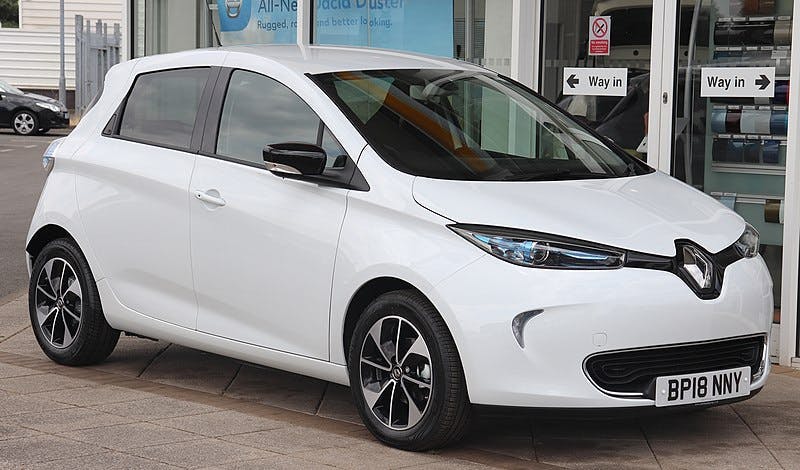
Photo© Vauxford (cc-by-sa/4.0)
The Renault Zoe is the cheapest car on our list, currently available at £29,495, though it's certainly not lacking! It has a driving range of up to 245 miles and can regain 90 miles in just 30 minutes with rapid charging. If you're charging your Zoe at home, it will take 9 hours and 25 minutes to go from 0 to 100%. If you're out and about and need a quick charge at a public charging station, you'll get around 75 miles out of a 1 hour charge.
Though it seems small, the Renault Zoe still packs a punch—boasting a 135-bhp electric motor designed with improved torque, better responsiveness and faster acceleration. Its B Mode feature increases engine braking with a simple press on the gear lever, decelerating as soon as you reach the accelerator. This means that drivers won't need to use the brake pedal as much in town or during slow-moving traffic. Additional driving assistance features include an Active Emergency Braking System, Lane Departure Warning and Blind Spot Monitoring.
2. Volkswagen e-Golf
From £31,075
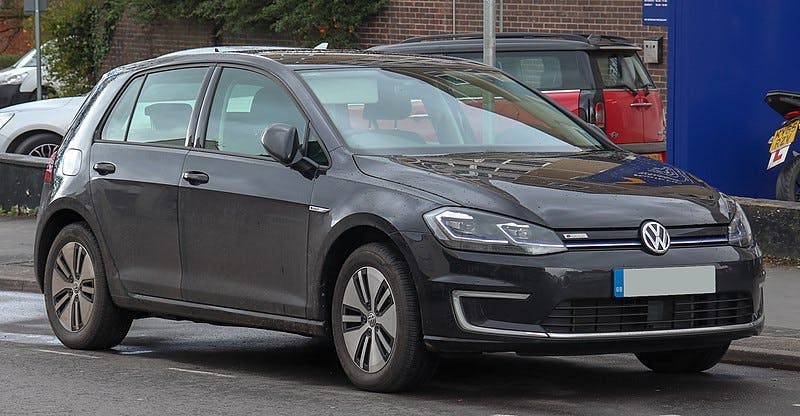
Photo© Vauxford (cc-by-sa/4.0)
Next on our list, and, at £31,075, not much more expensive than the Zoe, is the Volkswagen e-Golf. With a range of up to 186 miles, the e-Golf is ideal for drivers located in a city or coming in from further afield in their daily commute. With rapid charging, the e-Golf can be ready to go in 45 minutes—stretching to 650 minutes if you're charging at home.
With a much smaller range than the Zoe, you might think about discounting the e-Golf. However, it has plenty of other impressive features to offer. For starters, the Traffic Jam Assist comes with a camera and radar sensor that will help you to keep your distance during heavy congestion and avoid collisions. If you happen to drift out of the lane, the system will accelerate, brake or steer as needed. Placing pedestrian safety front and centre, Predictive Pedestrian Protection will alert you if there are any pedestrians at the edge of the road or on the carriageway.
3. Nissan Leaf
From £29,345 (eligible for PiCG)
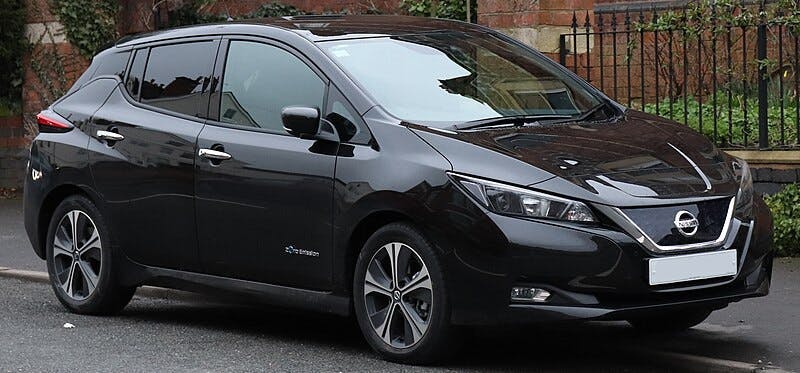
Photo© Vauxford (cc-by-sa/4.0)
If you're looking into buying an electric car, you'll be hard-pressed to find a single list that doesn't feature the Nissan Leaf. With a price tag of £29,345, the Leaf comes with advanced features and remarkable usability. It has a range of up to 168 miles and comes with a cable allowing you to charge it at home using a domestic socket.
If time is of the essence, you might want to consider adding a Nissan-certified charger to your garage. It will double charging speed for a full overnight charge and have you ready to go in no time. The most notable feature of the Nissan Leaf, meanwhile, has to be the e-Pedal. Enabling drivers to accelerate and decelerate with ease, you need only release the pedal for automatic regenerative braking and depress once more for acceleration. For a more immediate stop, you can stick to the trusty brake pedal.
4. Hyundai Ioniq Electric
From £31,450 (eligible for PiCG)
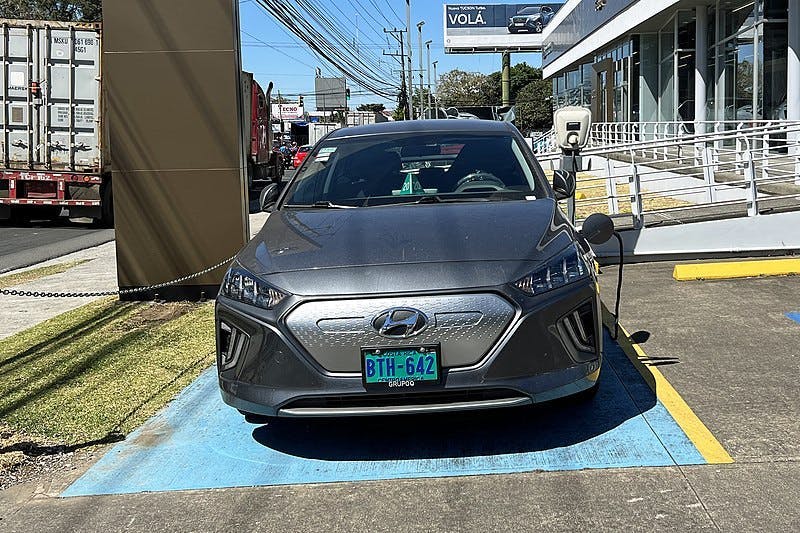
Photo© Mariordo (cc-by-sa/4.0)
Moving up to the pricier end of our list, at £31,450, the Hyundai Ioniq Electric has a 194 mile range, which certainly isn't something to turn your nose up at! As with most electric cars, the Ioniq Electric can be easily charged at home or on the go—with a 100% charge in 6 hours and 5 minutes. If you make use of a rapid charging station, however, you can get an 80% charge in approximately 57 minutes.
Hyundai advises drivers, however, to purchase a wall box to charge at home. Their preferred partner, Pod Point, help secure up to £500 government support for customers, enabling them to purchase and install their Smart Wallbox. If you're buying the Ioniq Electric brand new, you can enjoy the benefit of a 5 year unlimited warranty, 5 annual vehicle health checks and Hyundai roadside assistance.
5. Kia e-Niro
From £32,995 to £39,395
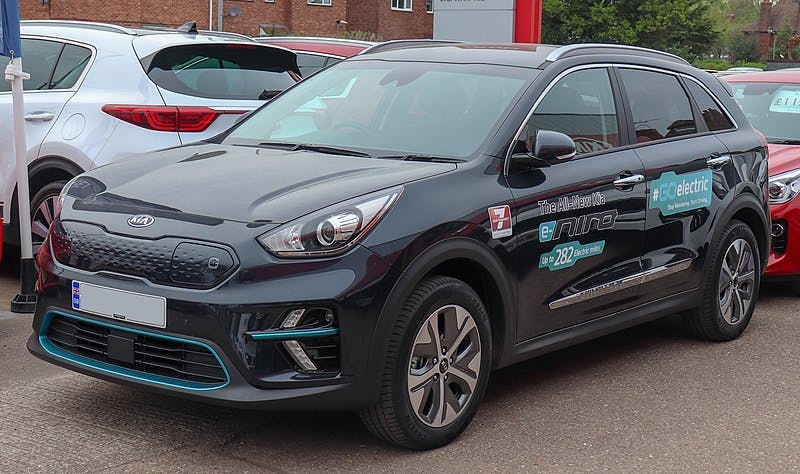
Photo© Vauxford (cc-by-sa/4.0)
Last on our list is the Kia e-Niro. Ranging from £32,845 (e-Niro 2) to £39,395 (e-Niro 4+), these are among the pricier e-cars on our list. However, as the winner of the What Car? Car of the Year 2019, it's clear that this electric car is something special. Initial production sold out, so if that's anything to go by, it's safe to say that the e-Niro gives drivers as much e-bang for their buck as possible.
For starters, a single charge can get you a range of up to 282 miles. With smart regenerative braking, drivers can recharge their battery with one-pedal driving. Hate traffic jams? Not for much longer! The e-Niro comes with Lane Following Assist which alters your car's acceleration, braking and steering according to the vehicle in front. It can even start automatically if the car ahead of you moves within 3 minutes of stopping. And with Forward Collision-Avoidance Assist, the e-Niro will automatically brake if you don't react to its warning signals after detecting a risk of collision.
Buying an electric car
As you can see, there's a decent variety when it comes to electric cars. The models we've listed here aren't the cheapest around, of course. If you're on a budget, yet like the idea of buying a tax-exempt vehicle, you might want to consider buying a used electric car instead. Bear in mind, however, that this means you won't qualify for the government grant. An alternative option could be to split the cost of the car and share it with family or friends.
If you're looking to buy a new car, it's important that you're not just basing your entire decision wholly on not having to pay vehicle tax. You need to weigh up the pros and cons of buying and driving an electric car. Fortunately, we've already done this for you in our guide to eco-friendly cars!
Are any other vehicles exempt from tax?

It's not all about electric cars. There are other certain types of vehicles that are exempt from vehicle tax.
- Disabled vehicles: if the registered disabled person is eligible for vehicle tax exemption. Find out if you're eligible here.
- Disabled passenger vehicles: not including ambulances, this covers vehicles used to transport disabled people.
- Mobility scooters, powered wheelchairs and invalid carriages: they can only reach up to 8mph on the road and must be fitted with a device that limits them to 4mph on footways.
- Historic vehicles: if you own a vehicle that was made before 1 January 1979, it is exempt.
- Vehicles with a SORN: if you apply for a Statutory Off Road Notification, you no longer have to pay vehicle tax. You will not be able to drive your car until you tax it again.
Taxing a tax-exempt vehicle
Now it's time for a slightly odd bit of legislation. You see, while you may be exempt from paying vehicle tax, you still need to go through the process of taxing your car. That's because your vehicle technically isn't tax-free—it's just that the cost of the tax is zero. This does mean that you'll have to deal with some paperwork (electronically, at least). Fortunately, though, it won't cost you a penny.
To tax your vehicle, you'll need your vehicle reference number, vehicle log book or a new keeper slip if you've only just bought the car. Then, all you've got to do is tax your vehicle online. The entire process should only take a few minutes to complete. After that, you don't have to worry about vehicle tax until next year!
Tax-Exempt Cars FAQs
1. Do I have to tax a car I've just bought?
It depends. If you're buying a car from a dealership, for example, they'll likely sort out vehicle tax along with everything else. If they don't, though, it will be up to you to sort out. Fortunately, it's a simple enough process to get through.
2. Do I have to tax my car even if I don't use it much?
Yes. Even if you're only using it once a month, it still needs to be taxed. If you're not using it at all, you should apply for a SORN. By doing so, you won't have to tax or insure your vehicle. Bear in mind, however, that your car will need to be kept on a driveway, in a garage or on private land. You also won't be able to use it until you start taxing it once more.
3. Are there any situations in which I can legally drive an untaxed vehicle?
There's only one situation in which you can get away with driving an untaxed vehicle—if you're on your way to a pre-booked MOT. Make sure you have proof of your appointment if you do take your untaxed vehicle out on the road, or you run the risk of receiving a hefty fine from the police!
4. How does the government monitor taxed and untaxed vehicles?
The police use ANPR cameras alongside the DVLA's electronic database. They will cross-check your number plate with the DVLA's records of taxed vehicles. If your vehicle is recorded as untaxed, then they'll flag it.
5. I can't find my reference number. How do I tax my vehicle?
You'll need to apply for a new vehicle log book in order to get your reference number. You can do this over the phone or by post. Alternatively, if you want to kill two birds with one stone, you can tax your vehicle at the Post Office and apply for your new log book at the same time.
6. How can I check if my vehicle is taxed?
It's simple enough—just use the DVLA's handy tax checker tool. All you've got to provide is your registration number and you can find out if it's been taxed or not.
Subscribe for driving advice, offers & more
We'd love to let you know about our courses, news and offers via email. You may unsubscribe at any time.
Star Genie Limited trading as PassMeFast. Company number 10093359
Copyright © 2024 owned by Star Genie Limited
PassMeFast, Blue Tower, MediaCityUK, Salford, M50 2ST

